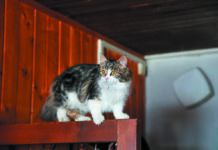You come home after being out all day to find your cat has urinated on your bed. Was she getting back at you for being left alone?
“Clients tell me all the time that their cats act out of spite,” says Stephanie Borns-Weil, DVM, the head of the Tufts Animal Behavior Clinic. “But spite is a human trait, not a feline trait. You need to be able to plan to do something spiteful — to work it out ahead of time and imagine the impact it’s going to have. Cats don’t have the forebrain capacity for all that.”
So what is going on when a cat does something that seems for all the world like she’s trying to “get back at you?”
What looks like spite is often anxiety or fear
“A cat who pees on the bed while you’re out is not angry,” Dr. Borns-Weil says. “She is very anxious. A lot of cats have varying degrees of separation anxiety when they are left alone, and her urinating in your personal space is actually a classic sign of it. When they urine mark on something that smells like you — that reminds them of you — it’s their way of trying to make something that feels uncomfortable a little more comfortable. It’s a coping mechanism for missing you. She can’t go to the store and buy you a bunch of roses and write you a note asking why you left her. But her biological impulse can indicate in her own feline way that she cares, that she is feeling distressed rather than disgruntled.”


Another way of thinking about it, Dr. Borns-Weil says, is to consider how you might handle your own feelings of anxiety. You may chew off the end of your pen or tear a piece of paper into tiny fragments. You’ve destroyed something, but it’s not because you’re angry. You’re simply engaging in displacement behavior — using a behavior that serves no purpose other than to try to help you stay calm in the midst of a situation over which you don’t have control.
Helping a cat direct her impulses constructively
Sometimes a cat does something that might be misinterpreted as spiteful when all it means is that you haven’t given her opportunities to act constructively on her feline impulses. For instance, if a cat scratches the arm of your expensive couch, perhaps you have not set her up for success with proper scratching spots that are easy to access. Or maybe you have failed to give her rewards for using her scratching posts appropriately.
And if she knocks over a glass bowl that then smashes on the floor, it’s because you gave her access to something that her impulse wasn’t going to be able to resist — or because she’s bored. Perhaps you don’t spend enough time engaging with her in games and training exercises that will enhance your bond. But she’s not getting back at you. She’s simply acting out her biological urges that have not been channeled into activities that keep items in your home from being ruined.
Bottom line: When your cat does something unfortunate, it’s not to teach you a lesson or show you she’s angry. It’s to cope with her environment. The way to fix the situation is to think about how you can step up to make her feel less anxious and more satisfied with her daily routine rather than about what she has done “to you.”





I’m a relatively new cat owner of three years. I adopted an 8 year old female Blended Calico, we just had our third anniversary! I wonder what can I do to train her not to bite me? I’ve read a lot about this common problem but don’t have much luck getting her to stop. I understand it’s like a love bite but sometimes she bites so hard that it breaks my skin a I bleed until I can clean the wound a apply a band-aid. She’ll also scratch me until it bleeds, I know it’s time for a nail trimming which I can’t seem to do by myself. Are there any help groups to show you how to do alone?
thanks!
Once had a feral cat-would wrap her in a towel, & put an e-collar on her ( a bowl also works) & trim her nails. For the biting, maybe Jackson Galaxy’s YouTube videos.
Gary, One thing is to give a high pitched yelp. Let her know she is hurting without punishment. She may not understand just how sharp her teeth and nails are. To “reject” she love will only confuse and hurt her emotionally. I also had a stubborn male who continued to hurt. I bit him in the ear after he hurt me. He looked very surprised and stop biting so hard.
It is more communicating like a cat rather then expect her to understand human.
My cat snuggles at bedtime but sometimes gets carried away and bites unseriously. I used to sternly say “no biting” and toss him off the bed. Now I just say it and he stops immediately and goes to lie at my feet.
To trim my cats nails, I get into a kneeling position with my cat between my knees. My crossed feet behind keep her from backing out. Do one front paw, then the other one. You probably won’t need to do back claws.